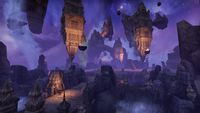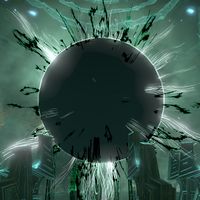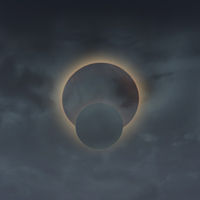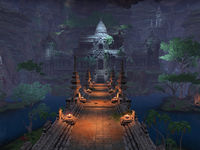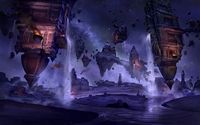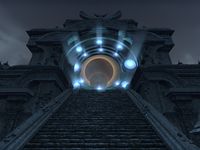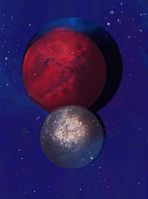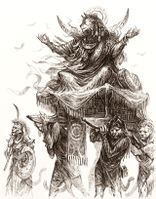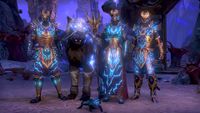Lore:Dark Moon
| Dark Moon | |
|---|---|
| Type | Moon |
| Realm | Mundus |
| Appears in | ESO |
The Dark Moon (or Dark Moons), also known as the Dead Moon,[1] the Hidden Moon,[2] the Hollow Moon,[3] the Ghost Moon,[4][5] the True Spirit of Lorkhaj,[6][7] and the Den of Lorkhaj, is rumored to be the corpse of the Missing God, Lorkhaj.[8] Due to the two moons, solar eclipses can happen in Tamriel several times a year and are known as Vampire Days.[UOL 1] During a dark eclipse, however, both moons eclipse the sun, and this alignment reveals the "third moon" (or "missing moon"). This event is significant to the Khajiiti people's spiritual duality. On the upside, their spiritual leaders known as Manes are born during this occurrence.[9] However, those born under the dark eclipse are sensitive to the moons, and thus are subject to the call of the Dark Heart, which could turn them into dro-m'Athra.[10] The Bent Cats themselves show reverence to the Dark Moon,[4] and are referred to as Children of the Dark Moon.[11][8] Their steeds, the Rahd-m'Athra, are thought to hail from the Dark Moons.[12] Khajiit deviants may mark themselves with tattoos reminiscent of the dark moon to show their defiance of social conventions.[13]Though initially a dangerous being, it is said that Lorkhaj was ultimately redeemed by Azurah and became protector of the Lunar Lattice, with the Moon Beast prowling the Lattice to protect souls from the Void from than on, thus ending its alignment with Namiira. Thus the Hidden Moon is considered the true spirit of Lorkhaj, freed of darkness.[7][14][1]
Depending on the context, the term "dark moons" can vary in meaning. One who is born during a dark eclipse may be described by their peers as "born under Dark Moons".[10] Various accounts exist on how to craft Daedric armaments, but one belief is that it should never be done during an eclipse.[15] When Jone and Jode are both new, the Khajiit may refer to the sky as having "two dark moons". Two dark moons symbolize bad luck.[16] Similarly, Khajiit often exclaim "dark moons" as a form of expression when misfortune occurs.[17] New moons are considered the "dark gambol" of the dro-m'Athra.[18] The Crow-Wife Clan of Reachmen sacrifice people at random every two-moons'-dark to Namira upon the Ever-Oozing Altar.[19] "Sangiin's Midnight" is another term used for when both moons are dark, and Khajiit may turn to using bright crimson red claw polish during this time.[20]
Mythology[edit]
Dawn Era[edit]
The Khajiit believe that Fadomai fled to the Great Darkness to give birth to her final child, Lorkhaj. Having been born amidst the Great Darkness, the Khajiit believe that Lorkhaj's heart was filled with such, and thus was the Great Darkness made aware of itself, learning its name, which was Namiira.[21] Amidst the darkness, surrounded by her children, Fadomai realized her death was near. In her final moments, she gave her daughter Azurah gifts in the form of three secrets. The First Secret gave Azurah dominion over the moons, Jone and Jode,[21] and in the future, the Dark Moon.[22][2] The spirit Alkosh compliments Azurah in that he ensures the movement of the moons with the tapestry of time, ensuring that they are not locked in place to prevent the undesirable from slipping through the Lunar Lattice.[23] The spirits Khenarthi and Herma-Mora are said to help Azurah maintain the Lunar Lattice, the "Moons and their Motions". Khenarthi is said to have aided Azurah in the beginning, while Herma-Mora is said to have eventually taken over from her when Khenarthi could no longer bear to do so.[24]
After Fadomai's death, Nirni approached Lorkhaj, whom she asked to create for her children a dwelling; he did so, and yet the Great Darkness in his heart influenced him to deceive his siblings so that they were trapped in the new place with Nirni. Some managed to escape death and become the stars, and those who remained punished Lorkhaj by tearing out his heart and hiding it deep within Nirni, so that he would be with her whom he had done the most harm.[21] Texts that predate the Riddle'Thar Epiphany speak of Lorkhaj surviving this encounter, allowing him to flee to Azurah with the hole in his chest, where she saw the darkness that came from Namiira still dwelling within his wound, keeping him alive and corrupting him by imitating his heart. Azurah cleansed Lorkhaj of the corruption and flung the Dark Heart into the Void, and Lorkhaj perished within Azurah's embrace.[25] From the Dark Heart came the twisted shade of Lorkhaj known as the Moon Beast, the first dro-m'Athra.[26][27] Thus Lorkhaj represents the duality of Khajiiti souls and their susceptibility to the Bent Dance,[26][27] which calls them to darkness through the "beating drum of the Dark Heart in [their] moments of deepest sorrow or most anguished regret".[28] The formation of Dro-m'Athra is said to be the result of the Void seeping into cracks which are created in the soul when one hears the beat of the Dark Heart, which Khajiit can naturally hear especially when feeling rage and anguish,[7][29] such cracks which can invite the Void are also said to form when one feels an emotion so strong it fills the spirit so completely as to make it crack.[30] These Khajiit that become dro-m'Athra would come to be known as the Children of Lorkhaj[8] and Namiira.[31] The Dark Heart of Lorkhaj also spawned the spirit Noctra at the steps of the Void Gate,[27] from the black blood it spewed,[25] evincing her claim to being part of the original void.[UOL 2]
Azurah embraced her brother until he died. She made a funeral pyre before the Varliance gate, and lit it with the Twin Lanterns of Jone and Jode.[26][25] Her tears fell upon the pyre and the ashes scattered across the Lattice.[25] As a result, it is said Azurah can call upon the "true spirit" of Lorkhaj to appear.[26] Sometime before the "first memory" of the Khajiiti people, Azurah used these Twin Lanterns to summon Lorkhaj's true spirit[26] to be a sky-guardian.[22] As the third moon, Lorkhaj shined his light upon the Khajiit, choosing the purest of heart to be part of the "Litter of the Hidden Moon", where they would learn the way of the Moonlight Blade.[22] On nights of the Ghost Moon, Azurah opens the Void Gate, and the false Lorkhaj, the Moon Beast, will challenge mortals until banished.[27] Furthermore, the spirit Boethra is said to wear the death-shroud of Lorkhaj on nights of the Ghost Moon, and "wages war beyond the Lattice".[32]
Modern Khajiiti beliefs on the third moon differ from ancient beliefs, with the birth of the Mane being the main purpose of its existence.[2] This belief could have existed since at least 1E 2902.[33] Furthermore, the reasoning for the Dark Moon's existence is different. Modern Khajiit believe that after Convention, Lorkhaj's body was hurled to the moons, and forced to follow Jone and Jode forever as punishment.[1][34] Apart from its role in selecting the Mane, the Dark Moon is viewed as a sinister force. Jone and Jode, the "Bright Moons" or "Blessed Moons", are invoked in prayer by the Twilight Cantors to banish the Dark Moon's influence from true cats.[35] Non-Khajiit purportedly have difficulty seeing the Dead Moon due to their eyes.[34] Though initially a dangerous being, it is said that Lorkhaj was ultimately redeemed by Azurah and became protector of the Lunar Lattice, with the Moon Beast prowling the Lattice to protect souls from the Void from than on, thus ending its alignment with Namiira. Thus the Hidden Moon is the true spirit of Lorkhaj, freed of darkness.[7][14]
One theory on the nature of the Dark Moon is explored in The Lunar Lorkhan. It argues both Masser and Secunda are two halves of Lorkhan's corpse and represent a "Cloven Duality".[36] However, the War of Manifest Metaphors contradicts this claim.[37] Additionally, both modern and ancient Khajiiti religion places the two moons as separate entities that existed prior to Lorkhan's punishment at Convention,[21] and only believe that the third moon is Lorkhaj's corpse.[1][34][8]
Black pearls are said to bear the blessing of the Hidden Moon, of Lorkhaj, and can be used to imbue lunar artifacts with power. The power of the Hidden Moon can be invoked by acolytes of the Order of the Hidden Moon to aid them.[7][38]
Second Era[edit]
The Two-Moons Path[edit]
In 2E 582, in the presence of the Dominion's leaders and other important figures at the Two Moons Path temple, the Moon Hallowed and Lunar Champion walked the last path—the Two Moons Path, where they would face Javad Tharn, and the sister would become the Mane. They traveled to the Plane of Jode and witnessed a possible future which would result in the fall of the Aldmeri Dominion, should they fail in their quest.[39] The pair persevered and made it to the last leg of their journey. At the Den of Lorkhaj, they encountered both Javad, and the other Lunar Champion whom was possessed by the Dark Mane. Tharn planned for his tainted Lunar Champion to walk the Path to become the Mane, as they represent the soul of the Khajiiti people, and would then ensure that the Khajiiti people would be plunged into darkness.[40] In the end, the Mane and the Moon Hallowed had prevailed, and the battle against Javad Tharn was over. The other Lunar Champion that was tainted sacrificed herself and was set free by this, and thus was able to reach Aetherius. After their victory, at Dune, Rid-Thar-ri'Datta gave his blessing for the new Mane of Elsweyr.[41]
A Rage of Dragons[edit]
After the retrieval of the fabled Wrathstone in 2E 582, the Imperial battlemage Abnur Tharn inadvertently unleashed the Dragons from their containment from the Halls of Colossus, allowing them to continue in their quest to steal lunar power of Jode's Core.[42] An ancient enemy of Queen Anequina rose from the dead and forced the moons into a dark eclipse,[43] allowing the Dragons to enter the Plane of Jode through Anequina's moon gate. Kaalgrontiid attempted to consume energy from the moon's core. Queen Anequina's descendant, Khamira, was able to banish Kaalgrontiid from the plane before he was able to fully absorb the core's power, though he still managed to absorb incredible power, consisting primarily of the lifeforce of his fellow dragons sealed within the Core as well as a lesser amount of lunar energy, before his banishment .[44][45][46]. Abnur Tharn was subsequently summoned to Pellitine by the Mane to discuss the arcane implications of the false eclipse, the Khajiit born under it, and the Mane's succession.[47]
The Rajaska and the Moon Beast[edit]
In 2E 582 Nirn would experienc an incursion of Rajaska, a type of powerful dro-m'Athra born when a Moon-Singer or Twilight Cantor falls to the Bent Dance. These Bent Cats, under the leadership of the first of their kind, the Rajaska-zhar Ravith-morna, turned more Twilight Cantors into Rajaska, hoping to enact a plan that'd threaten the entire Khajiit afterlife.[7][14][48][49] It is said that in some cases powerful unresolved emotions can cause the soul itself to crack and be wounded, allowing for a Void to be created within it. This Void-wound can prevent a spirit from moving into the afterlife beyond, even if they've been accepted, with the spirit holding itself back until its lingering affairs are resolved and the Void-wound is healed. In cases where a soul's strong unresolved emotions have caused a Void to form within it, that Void can be tapped into, serving as a source of great power. A soul's Void can even be used to create a rift across the planes, a shortcut allowing one to bypass planar boundaries to the afterlife. As emotions of love are said to create a real arcane connection between two souls, one who has such a bond with another soul can draw upon the loved one's soul for power should they know how, which includes tapping into the Void within that soul for their own use.[50][51][7] When either a soul is wounded by the Void or two souls wounded and darkened by it meet in a manner that mirrors the myth of Lorkhaj, revolving around a betrayal and a heart that is darkened by it, the recreation of the myth can give birth to a Moon Beast.[14] A beast of "pure darkness incarnate" formed within the Void itself, a reflection of the Void-Shade of Lorkhaj born of his Dark Heart. If formed, such a creature initially slumbers within the Void,[52][14] but can be called forth by the songs of the Rajaska.[48] The Rajaska attemptted to utilize these arcane phenomena to give rise to a new Moon Beast, and succeeded in doing so. Ravith-morna planned to use the Void-rift born of the soul of Zerith-var to have the Moon Beast reach Azurah's Crossing, where it is said it would have been capable of ending that afterlife itself, hunting and seizing any and all souls that attempt to cross over into the beyond and dragging them to the Void to be corrupted, thus ultimately making real a world of darkness, the dream of all Dro-m'Athra.[51][7][49][53]. The Vestige and Zerith-var, alongside the aid of Cantor Krin'ze inside whom the soul of an ancient Moon-Singer had reincarnated[51][7][50][54] managed to stop this Moon-Beast before it reached the rift to the Crossing, banishing it back to the Void by invoking the power of the Hidden Moon.[7][55]
Notes[edit]
- The Breton mage of legend, Gyron Vardengroet, was born while the moons were eclipsed.
Gallery[edit]
References[edit]
- ^ a b c d Moon Bishop Hunal Answers Your Questions — Moon Bishop Hunal
- ^ a b c Vastarie's dialogue in ESO: Elsweyr
- ^ Idol of the Hollow Moon item description in ESO
- ^ a b Crafting Motif 35: Dro-m'Athra Style — Twilight Cantor Adara'hai
- ^ The Wandering Spirits — Amun-dro, the Silent Priest
- ^ The Sky Spirits — Amun-dro, the Silent Priest
- ^ a b c d e f g h i j Zerith-var's dialogue in ESO
- ^ a b c d Shazah's dialogue in ESO
- ^ Pocket Guide to the Empire, 1st Edition: The Elsweyr Confederacy — Imperial Geographical Society, 2E 864
- ^ a b Za'ji's dialogue in ESO: Dragonhold
- ^ Akkhuz-ri's dialogue in ESO
- ^ Rahd-m'Athra mount description in ESO
- ^ Dark Moons Headwrap and Dark Crescent Moons marking descriptions in ESO
- ^ a b c d e Viti's Notes: Moon Beasts — High Cantor Viti
- ^ Heavy Armor Forging — Sven Two-Hammers
- ^ New Moons Cross-Sash Robe costume description in ESO
- ^ Elazura, Naraku, Klarari, and a plethora of other Khajiit using "dark moons" as an exclamation in ESO
- ^ Litter-Mates of Darkness — Moon-Bishop Hunal
- ^ A Life Barbaric and Brutal — Arthenice Belloq
- ^ Bottle of Red Claw Polish item description in ESO
- ^ a b c d Words of Clan Mother Ahnissi — Clan Mother Ahnissi
- ^ a b c The Tale of Three Moons
- ^ Moon-Bishop Azin-jo's dialogue in ESO: Elsweyr
- ^ The Worldly Spirits — Amun-dro, the Silent Priest
- ^ a b c d The Favored Daughter of Fadomai — Amun-dro, the Silent Priest
- ^ a b c d e The Sky Spirits — Amun-dro, the Silent Priest
- ^ a b c d The Dark Spirits — Amun-dro, the Silent Priest
- ^ Epistle on the Spirits of Amun-dro Vol 1 — Thava-ko
- ^ High Cantor Viti's dialogue in ESO
- ^ Viti's Notes: Order of the Hidden Moon, Part II — High Cantor Viti
- ^ Adara'hai's dialogue in ESO
- ^ The Wandering Spirits — Amun-dro, the Silent Priest
- ^ Shazah's dialogue on Mane Jinninji-ri in ESO
- ^ a b c The Moon Cats and their Dance — Clan Mother Ahnissi
- ^ Mantra of Expulsion
- ^ The Lunar Lorkhan — Fal Droon
- ^ Den of Lorkhaj loading screen text in ESO
- ^ Zerith-var's ability descriptions in ESO
- ^ The Moonlit Path quest in ESO
- ^ Javad Tharn's dialogue in ESO
- ^ The Den of Lorkhaj quest in ESO
- ^ Events of The Halls of Colossus in ESO
- ^ Events of Cadwell the Betrayer in ESO
- ^ Events of Jode's Core in ESO: Elsweyr
- ^ Nahfahlaar's dialogue during of New Moon Rising in ESO: Dragonhold
- ^ Abnur Tharn's dialogue in ESO: Dragonhold
- ^ Envoy Cashia's dialogue during The Heir of Anequina in ESO
- ^ a b Eifa's dialogue in ESO
- ^ a b Ravith-morna's dialogue in ESO
- ^ a b Viti's Notes: Order of the Hidden Moon, Part I — High Cantor Viti
- ^ a b c Cantor Krin'ze's dialogue in ESO
- ^ Cantor Izalgo's Journal — Cantor Izalgo
- ^ Paths Out Of Darkness quest description in ESO
- ^ Krin'ze's Journal — Cantor Krin'ze
- ^ Events ofThe Dark Behind the World in ESO
Note: The following references are considered to be unofficial sources. They are included to round off this article and may not be authoritative or conclusive.
|
||||||||||||||||||||||||||||||||
